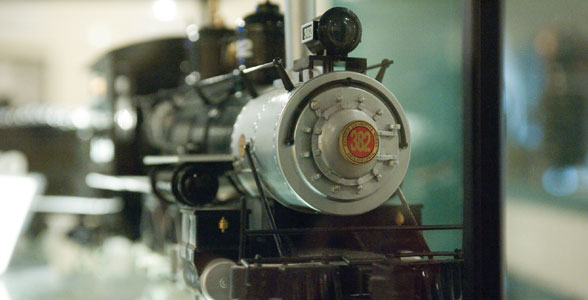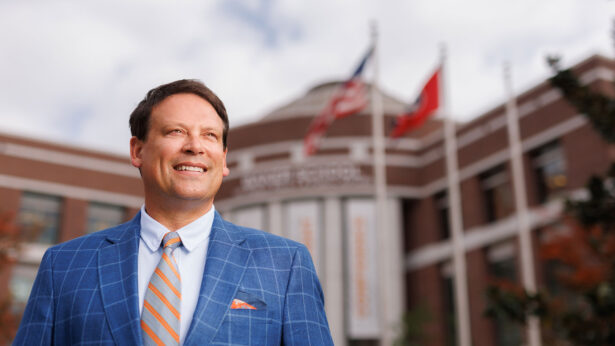By Bud Grimes
President George H.W. Bush and First Lady Barbara Bush, Led Zeppelin lead singer Robert Plant, and former Soviet leader Mikhail Gorbachev have something in common with millions of other people. They’ve visited the Casey Jones Village in Jackson, Tennessee.
Located off Interstate 40 at exit 80A, the village is recognized as a top-ten tourist attraction by the Tennessee Department of Tourist Development. The village’s success is the fulfillment of a vision by the late Brooks Shaw. Today, his son, Clark, and daughter, Deborah Shaw Laman (Martin ’79), lead the company, while their eighty-eight-year-old mother, Miss Anne, provides inspiration as the business creates new attractions and prepares for future generations of visitors.
Named for railroad engineer Casey Jones of Jackson—who died in a famous train wreck April 30, 1900, in Vaughan, Mississippi—the village is the site of Jones’ home, managed by the village but owned by the city. In addition to the Casey Jones Home and Railroad Museum, the complex includes Brooks Shaw & Son’s Old Country Store, the Judge Milton Brown Railcar (part of the museum tour), shops, an amphitheater, a church, and Casey Jones Mini Golf. An antebellum home that was moved to the site last summer will open later this year for weddings and special events. American Family Radio also has a tower on the property that simulcasts from its flagship station in Tupelo, Mississippi, the first such station established when it went on the air in 1992.
The family credits Brooks Shaw for what the village is today. Shaw, president of Kelly Foods canned meat division in Jackson and an antiques collector, opened the Old Country Store in 1965. It outgrew its original location and in 1978 moved to the current site.
Clark Shaw and Deborah Laman grew up working in the business, and both pursued paths that eventually led them back to the village. “I knew by the time I was fifteen this was what I wanted to do with my life,” Shaw says. He attended Union University and Jackson State Community College before enrolling at UT Knoxville, where he majored in business. “But then, at the end of my junior year, we were beginning to get very serious in . . . the development of this village,” he said. He came back home in late 1976 and was never able to return to college. His son, Brooks, a junior at Ole Miss, will someday become the third generation to run the business.
Like her brother, Deborah Laman attended Jackson State but later enrolled at UT Martin. Only three weeks after arriving on campus, she met her future husband, Jon (UTM ’79).
Today, Shaw and Laman lead a business that welcomes some 700,000 visitors annually. “First and foremost, we are a Christian-owned company. We don’t serve alcohol, and it’s very important to us to create a good, clean family atmosphere for our guests,” Deborah says.
Food is at the heart of the business, and Shaw’s wife, Juanita, is constantly working on new recipes and systems in the kitchen. The food business has grown with the addition of the to-go takeout that features the same food served at the buffet. Miss Anne tells about a man she met in the to-go area, who told her “My family would starve to death if it wasn’t for your place.”
Customers who save room for dessert can satisfy their sweet tooth at the ice cream parlor. “Our ice cream parlor was named one of the top fifty in the nation by USA Today this past summer, so that was huge,” Laman says. Her dad acquired the classic soda fountain from a Mississippi grocery store.
Interestingly, the Gorbachev visit was a spur-of-the-moment affair. He had come to Jackson for a speaking appearance and decided he wanted to try some local Southern food. “I got a call, and fifteen minutes later, there was Gorbachev” with his entourage, Shaw recalls. The Soviet Union leader’s name is on the chair in which he sat.
Laman says the largest event at the village was when George H.W. Bush visited Jackson in fall 1988 during the presidential campaign. Other notable attendees included Barbara Bush, former senator Dan Quayle, and the late Reverend Adrian Rogers of Bellevue Baptist Church in Memphis, who gave the invocation. The Secret Service estimated the crowd at ten thousand.
Famous musicians are also among village guests. Robert Plant of Led Zeppelin fame once visited, and when a server recognized him and asked if he was Robert Plant, “he said, ‘Yep, but don’t tell anybody,’?” Shaw remembers. Rockabilly legend Carl Perkins once had a museum on the site that was managed by the village, and Shaw spent a couple of hours one day hearing Perkins’s stories about Elvis Presley, the Beatles, and other music greats.
Keeping the business fresh is a top priority as Shaw manages the village’s master plan. Current plans are for a newly arrived 105-year-old church to be open daily as a prayer chapel and also used for weddings, gospel singings, and Bible studies. The Neil House, recently moved to the village from Trenton, Tennessee, will be used for historic tours and as a backdrop for special events, while a recently acquired seventy-year-old tenant house will be moved to the site, renamed Fish Camp Cabin, and used for private catered events. It’s also possible that two early-nineteenth-century log cabins will be relocated to the village and restored as bed-and-breakfast accommodations.



